Editor's note: This is the 25th article in the COVID-19 Global Roundup series. Here is the previous one.
Anyone caught breaking Singapore's social distancing rules can land themselves in prison from Friday after the city-state made it an offence for a person to intentionally stand close to another person as part of its coronavirus defense.
Singapore has won international praise for its fastidious approach in tackling the virus, which has included using police investigators and security cameras to help track suspected carriers.
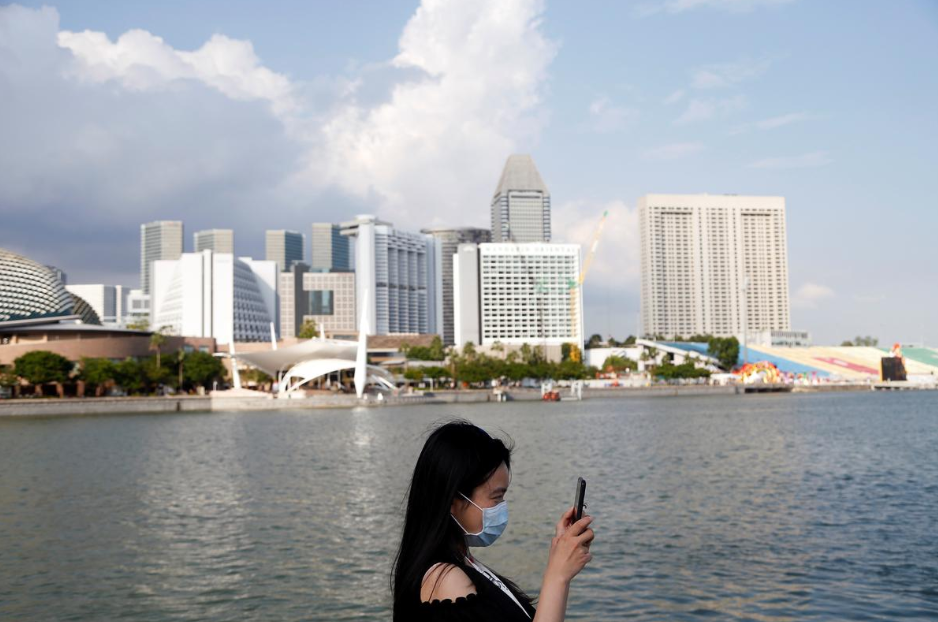
A tourist wearing a protective face mask takes photos at the Merlion Park in Singapore, January 28, 2020. /Reuters
A tourist wearing a protective face mask takes photos at the Merlion Park in Singapore, January 28, 2020. /Reuters
With one of the world's highest population densities, the city-state this week announced more stringent social distancing measures such as shutting bars, limiting gatherings of up to 10 people outside work and school as well as a ban on large events.
Under updates to its powerful infectious diseases law, anyone who intentionally sits less than one meter away from another person in a public place or on a fixed seat demarcated as not to be occupied, or who stands in a queue less than a meter away from another, will be guilty of an offence.
Offenders can be fined up to 10,000 Singapore dollars (6,990 U.S. dollars), jailed for up to six months, or both.
The rules, in place until April 30, can be applied to individuals and businesses.
Some countries including Italy, Britain and New Zealand have gone into complete lockdown, but Singapore has avoided the move. Authorities have said more drastic measures may be needed if locals do not take social distancing seriously.
Singapore is well known for its tough punishment for misdemeanors. Many have attributed the country's economic success in the past decades to its highly stringent rule of law.
While the Southeast Asian country has yet to make substantial arrests as regulations are relatively new, authorities in other countries have rounded up a considerable number of people under directives given in response to the pandemic outbreak.
In Greece, authorities have repeatedly warned people against flouting coronavirus-induced measures. While most Greeks heed the government's call to enter self-quarantine, defiance of these warnings is still visible.
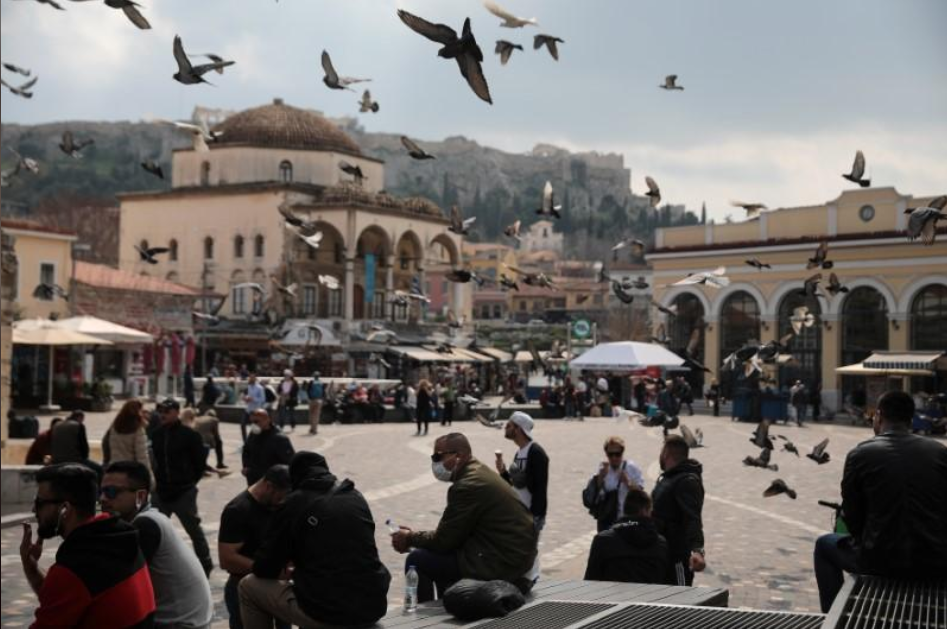
A man wears a protective mask as he sits on Monastiraki Square in Athens, Greece, March 15, 2020. /Reuters
A man wears a protective mask as he sits on Monastiraki Square in Athens, Greece, March 15, 2020. /Reuters
Hundreds of business owners and individuals have been arrested by police for violating restrictions put in place. In some crowded places that are packed with people, police have been sent out with loudspeakers on cars urging them to return home but no arrests has been made. The police said most of those detained are owners and managers of small businesses such as retail stores, hair salons, cafes, restaurants and florists.
A Greek Orthodox priest was reportedly arrested on Tuesday for holding mass.
The country went into lockdown on Sunday. Public gatherings were restricted to 10 people and authorities subsequently ordered hotels across Greece to close until April 30. Closure of other public venues including schools, gyms, cinemas, restaurants, bars, nightclubs, retail shops, shopping malls, museums and archaeological sites has been in place since March 10.
In Spain, where a nationwide lockdown was introduced on March 14, the army and police have been deployed to enforce the temporary measure. El Pais reported on Wednesday that at least 900 arrests were made and more than 100,000 police reports were filed for disobedience.
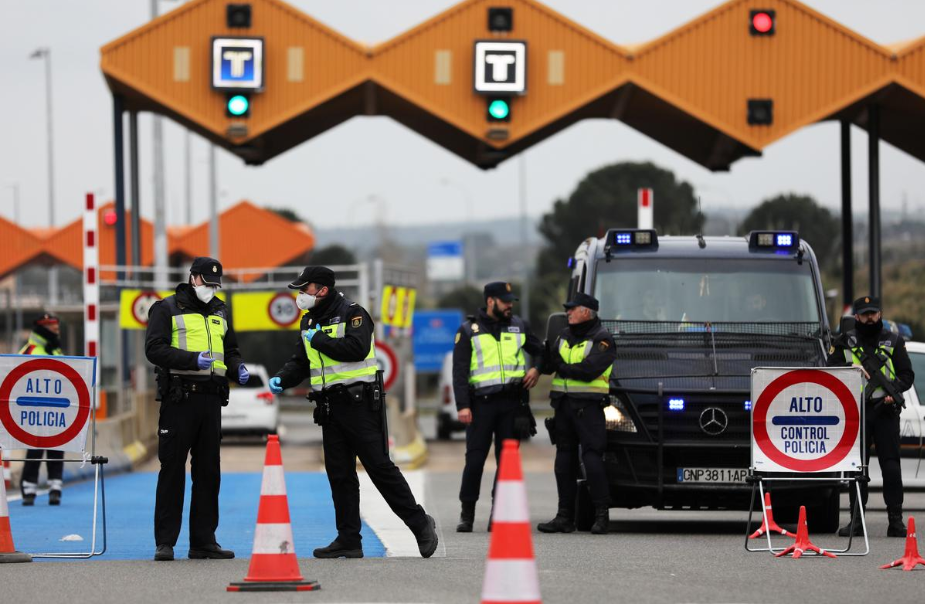
Border police officers wait to check vehicles at the last toll gate entering Spain from France, following an order from the Spanish government to set up controls at its land borders over coronavirus, in La Jonquera, Spain March 17, 2020. /Reuters
Border police officers wait to check vehicles at the last toll gate entering Spain from France, following an order from the Spanish government to set up controls at its land borders over coronavirus, in La Jonquera, Spain March 17, 2020. /Reuters
In police efforts to prevent people from disobeying government-imposed contingencies, some officers have also gone undercover. Undercover cops were reported on Thursday to have arrested eight people for planning a drug-fueled orgy in Barcelona.
Spain's Interior Minister Fernando Grande-Marlaska warned of "unsupportive" members of the public who are flagrantly defying rules designed to contain the spread of coronavirus. While he acknowledged that the majority has been obeying rules, he pointed out that the sentence for these offences can be up to four months, stressing the serious consequences that could come with it.
On Thursday, the Spanish parliament unanimously approved to extend its state of emergency until April 11.
Strict measures can also been seen in countries less affected by the pandemic. Jordan, with less than 200 confirmed cases, has implemented one of the strictest lockdowns in the world, forcing most people to stay at home and temporarily shutting down even grocery stores and pharmacies.
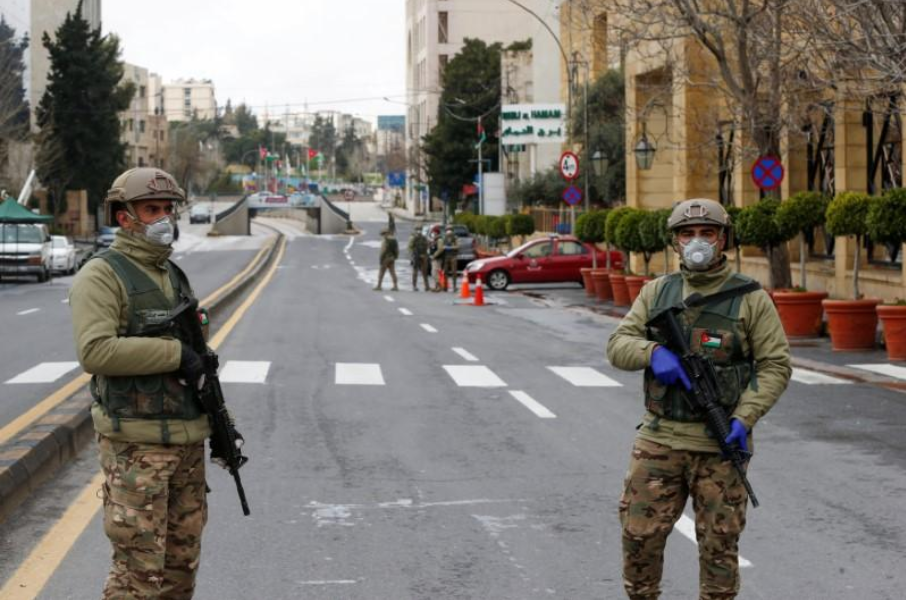
Jordanian army members stand guard at a check point after the start of a nationwide curfew, amid concerns over the coronavirus disease (COVID-19) spread, in Amman, Jordan March 21, 2020. /Reuters
Jordanian army members stand guard at a check point after the start of a nationwide curfew, amid concerns over the coronavirus disease (COVID-19) spread, in Amman, Jordan March 21, 2020. /Reuters
More than 1,600 people have been arrested for breaking the nationwide curfew. The curfew rules were much more drastic than most of the hardest-hit countries, which have placed lockdowns for weeks but stopped short of arresting people for going out of their homes.
While Jordan's approach has brought a slew of difficulties to its people, the Jordan Times reported on Thursday about a recent survey saying the vast majority of Jordanians approved the government measures to tackle the coronavirus.
Authorities eased restrictions on movement on Tuesday, the fourth day of the lockdown, allowing people to leave their homes on foot for essential trips, such as purchasing food from small convenient stores and obtaining medicine. A curfew is still in place from 6 p.m. to 10 a.m.
Coronavirus-related arrests are not limited to people violating emergency rules in public. Individuals making social media posts flagged by respective governments are also subject to detention and indictments.
In Turkey, authorities have rounded up more than 400 people for making "provocative" posts on social media about the coronavirus outbreak, Interior Minister Suleyman Soylu said on Wednesday.
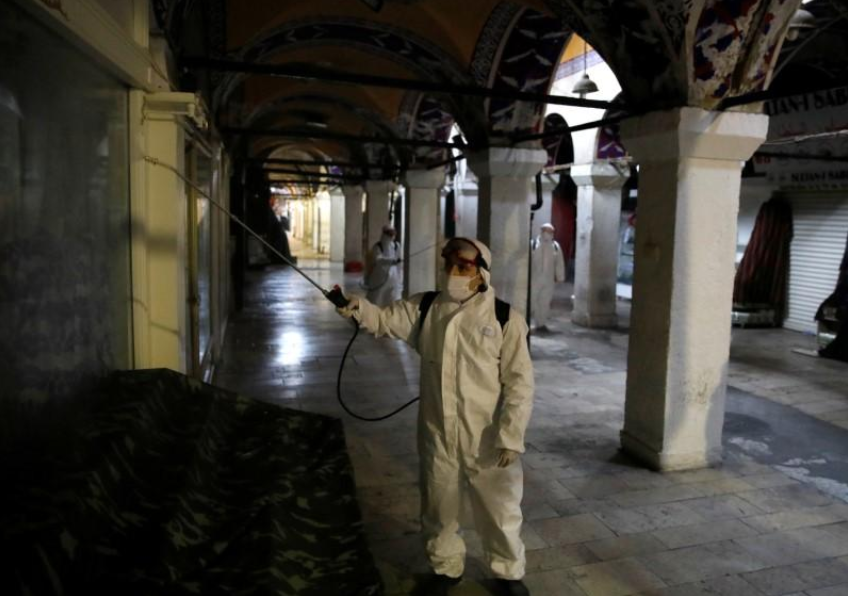
A worker in a protective suit sprays disinfectant at Grand Bazaar, known as the Covered Bazaar, to prevent the spread of coronavirus disease (COVID-19), in Istanbul, Turkey, March 25, 2020. /Reuters
A worker in a protective suit sprays disinfectant at Grand Bazaar, known as the Covered Bazaar, to prevent the spread of coronavirus disease (COVID-19), in Istanbul, Turkey, March 25, 2020. /Reuters
Soylu said almost 2,000 social media accounts had been identified making provocative posts about the outbreak, resulting in the detention of 410 people "attempting to stir unrest."
He said that most of the accounts were linked to militant groups, without giving further details of the identities of the suspects.
Some of the arrests were over posts that showed youths mocking elderly people for venturing outside during the lockdown, he said. Such posts have been a source of public anger in Turkey.
While the rate of new diagnoses in Turkey is among the highest in the world, its leadership is divided over a full lockdown. The country has so far shut schools, cafes and bars, banned mass prayers, postponed sports matches and suspended flights.
Despite Health Minister Fahrettin Koca's recommendation, President Recep Tayyip Erdogan has refrained from implementing a nationwide lockdown, due to concerns of its impact on the already declining economy.
Other smaller-scale arrests over social media posts have been made around the globe, with some due to dissemination of misinformation and some because of brazen flout of government measures.
In early March, six Indonesians allegedly claiming false infections or deaths caused by the coronavirus were arrested by the authorities. Amid the threat of legal action if coronavirus-induced directives were violated, a foreign national in the United Arab Emirates posting videos on Instagram of himself at a recently-closed beach flouting the ban on gathering in public spaces, ignoring a police patrol and mocking the new regulations prompted the authorities to arrest him.
(With input from agencies)